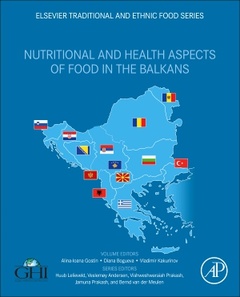Description
Nutritional and Health Aspects of Food in the Balkans
Nutritional and Health Aspects of Traditional and Ethnic Foods Series
Coordinators: Gostin Alina-Ioana, Bogueva Diana, Kakurinov Vladimir
Language: English
Subjects for Nutritional and Health Aspects of Food in the Balkans:
Keywords
?Agricultural sustainability; Ajvar; Ancient civilizations; BRANO Yogurt; Balkan cuisine; Balkan cuisine history; Balkan traditional diet; Balkans; Belmuž; Bieno sirenje; Biodiversity; Bosnia; Bulgarian traditional foods; Bulgarian white brined cheese; Bulgarian yogurt; Cherni Vit green cheese; Cooking and preservation methods; Croatian dietary habits; Cuisine; Culinary code; Cultural identity; Culture; Culture and traditions; Diet; Dish; Eating habits; Energy intake; European Union; European part of Turkey; Food and nutrition security; Food culture; Food culture and traditions; Food history; Food in the Balkans; Food product; Food safety; Food taboos; Food traditions; Galicki kaskaval; Gastronomic tourism; Gastronomy events; Geographical diversity; Geographical indication certification; Greek gastronomy; Harmonization indicators; Harmonization of food law; Health; Healthy; Herzegovina; Katuk; Komplet lepinja; Kosovo cuisine; Lifestyle; Macedonian traditional food; Macedonian wine; Makalo; Mangalitsa; Mediterranean diet; Montenegro; Noncommunicable diseases; Nutrition; Nutrition labeling; Nutrition-sensitive agriculture; Nutritional deficiency; Nutritional situation; Olive oil; Olives; Pastrmajlija; Physical inactivity; Policy gaps; Protected designation of origin; Protected geographical indications; Quality schemes; Romanian; Serbia; Slovenian traditional foods; South East Europe; Sustainability; Sustainable; Sustainable development; Tavce gravce; Thrace region; Tradition; Traditional; Traditional Albanian food; Traditional cuisine; Traditional food; Traditional food products; Traditional foods; Traditional products; Traditional specialties
366 p. · 19x23.3 cm · Paperback
Description
/li>Contents
/li>Readership
/li>Biography
/li>Comment
/li>
Nutritional and Health Aspects of Food in the Balkans s introduces and analyzes traditional foods from the Balkans. Beginning with the eating habits in Balkans, this book unfolds the history of use, origin, compositions and preparation, ingredient origin, nutritional aspects, and the effects on health for various foods and food products of the region. Nutritional and Health Aspects of Food in the Balkans also addresses local and international regulations and provides suggestions on how to harmonize these regulations to promote global availability of these foods. A volume in a series co-produced with Global Harmonization Initiative, Nutritional and Health Aspects of Food in the Balkans is sure to be a welcomed reference for nutrition researchers and professionals, including nutritionists, dieticians, food scientists, food technologists, toxicologists, regulators, and product developers as well as educators, and students.
Prologue
Chin-Kun Wang
Foreword
Boyko Nadiya
1. Traditional Balkan foods in a global context: an introduction
Alina-Ioana Gostin
Import 16-Oct-2019 10:08
2. History of eating habits in the Balkans
Alina-Ioana Gostin and Diana Bogueva
3. Balkan food cultures and traditions
Evgenia Krasteva-Blagoevaand Diana Bogueva
4. Food, nutrition and health in Albania
Diola Dosti, Orana Sinani and Indrit Tila
5. Food, nutrition and health in Bosnia and Herzegovina
Slavica Samardzic, Gordana Ðuric, Vesna Rudic Grujic, Gordana Radovanovic, Tarik Dizdarevic and Suzana Ðordevic-Miloševic
6. Food, nutrition and health in Bulgaria
Diana Bogueva, Magdalena Apostolova and Svetla Danova
7. Food, nutrition and health in Croatia
Daniela Cacic Kenjeric and Darja Sokolic
8. Food, nutrition and health in Greece
Tryfon Adamidis, Maria Papageorgiou and Kyriaki Zinoviadou
9. Food, nutrition and health in Kosovo
Agim Rysha
10. Food, nutrition and health in Macedonia
Vladimir Kakurinov, Valentina Pavlova and Nadica llievska
11. Food, nutrition and health in Montenegro
Aleksandra Martinovic and Slavko Mirecki
12. Food, nutrition and health in Serbia
Suzana Ðordevic-Miloševic, Jasna Mastilovic, Svetlana Stanišic and Nataša Kilibarda
13. Food, nutrition and health in Slovenia
Maša Knez Hrncic, Darija Cör and Željko Knez
14. Food, nutrition and health in Romania
Corina-Aurelia Zugravu, Dana Gafitianu and Anca Ioana Nicolau
15. Food, nutrition and health in Moldova
Rodica Sturza and Aliona Ghendov-Mosanu
16. Food, nutrition and health in Turkey, the European part
Birsen Bulut-Solak
17. Common nutrition and health issues
Dzengis Jasar and Biljana Curcic
18. Common regulatory issues and proposals to harmonise regulations
Iuliana Vintila
19. Traditional Balkan Foods:Future Outlook
Ismail Hakki Tekiner
nutrition researchers and professionals, including nutritionists, dieticians, food scientists, food technologists, toxicologists, regulators, and product developers as well as educators and students
Diana is an interdisciplinary researcher with varied interests in food consumption issues related to the global consequences of human nutritional habits, especially global meat consumption, alternative proteins, novel food processing technologies including non-thermal, behavioural and attitudinal change, environmental sustainability and food harmonization. She has a PhD in Humanities specialised in Food Sustainability from Curtin University, Perth, Australia. Currently she is a Centre Manager of the Centre for Advanced Food Engineering at the University of Sydney and Research Fellow with Curtin University’s Sustainability Policy (CUSP) Institute.
Diana’s books have won three awards: the Australian National Best Book winner in 2019 and the World’s Best Book award 2020 in the Vegetarian book category from the Gourmand Awards, who also recognized her co-edited book ‘Environmental, Health and Business Opportunities in the New Meat Alternatives Market’.
Dr. Vladimir Kakurinov is a Full Professor in Food Microbiology and Food Quality and Safety. He worked at the Faculty of Agricultural Sciences and Food, Ss. Cyril and Methodius University and the Veterinary Medicine Faculty at St. Kliment Ohridski University, both in Republic of Macedonia. Now, he is founder and Executive Director of Consulting and Training Centre KEY dealing with international projects.
- Analyzes nutritional and health claims in the Balkan region
- Includes traditional foods from the Balkans
- Explores both scientific and anecdotal diet-based health claims
- Examines if foods meet regulatory requirements and how to remedy noncompliance
- Reviews the influence of historical eating habits on today’s diets




